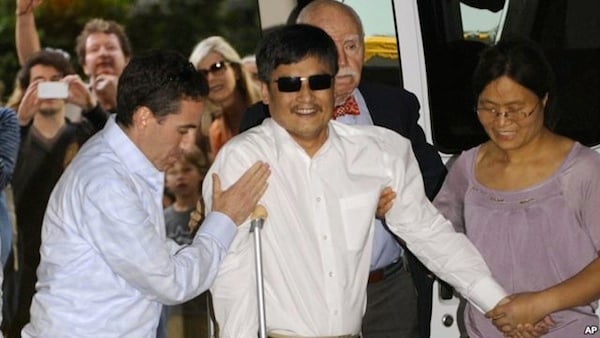Three Thoughts on Chen Guangcheng’s Activist Future

Chen Guangcheng arrives at NYU on May 19. Source: Google Images
At the beginning of May, I analyzed the unfolding Chen Guangcheng diplomatic controversy with the valuable input of guest contributor and Atlantic fellow Helen Gao. Today, I look ahead to what Mr. Chen’s future may hold.
A little over a month ago, dissident Chen Guangcheng was living under house arrest in a farming village in Dongshigu, China. Now, Mr. Chen and his family live in Greenwich Village in New York City, hosted by NYU, where he will soon study law. Mr. Chen’s role as a public figure is also changing. Over the years, Mr. Chen has gone from being a legal advocate to being a prisoner in his own home to being at the center of international diplomatic negotiations. As Mr. Chen begins his life as a student and public figure in the United States, I find myself wondering: what does Mr. Chen’s future life as an international human rights icon hold for him? Here are a few thoughts, based on recent news:
- Mr. Chen’s dealings with the Chinese authorities are not over, and Mr. Chen may once again become an activist based in China. In light of his disappearance, Mr. Chen’s family has endured extreme harassment and abuse. His brother Chen Guangfu said he was “chained to a chair and beaten for three days to make him reveal how his sibling had escaped from house arrest”; his brother’s son is now facing an odd charge of attempted murder, a capital crime, after “using knives to fend off local officials who burst into his home on April 27, the day after they discovered his blind uncle had escaped.” Amidst all the excitement over Mr. Chen’s arrival in the U.S., it seems important to remember that many of his family members, not to mention his life’s work, remain in China. According to NYU professor Jerome Cohen, who helped bring Mr. Chen to the U.S., Mr. Chen and his wife may return to China in about a year from now.
- Mr. Chen is joining the ranks of Chinese dissidents who can easily garner international attention but have difficulty reaching their own citizens due to government censorship. I have no simple predictions for how Mr. Chen’s role in China will eventually evolve, but one of his fellow dissidents, the artist Ai Weiwei, has high hopes. In a recent interview with the Chicago Tribune, Mr. Ai expressed his confidence in the rallying power of Mr. Chen’s story, explaining that “The most unfair things that could have happened in a society fell upon a blind man…This is something that no one can accept or explain away with any excuse. Everyone will ask: ‘Do we actually have to exist in a society like this?’” As news about Mr. Chen slowly makes its away around China despite the best efforts of Internet censors, Mr. Ai’s question may well be on the minds of many Chinese citizens. I also wonder about the possibility for future collaboration and exchange between these dissidents; in a recent phone call, Mr. Ai and Mr. Chen expressed their support and admiration for one another.
- Mr. Chen is a source of substantive knowledge and insight on the legal climate in the world’s most powerful emerging market. He could make an important contribution to current thinking on the rule of law, an area of democracy studies sometimes overshadowed by an emphasis on elections. In a May 29 New York Times op-ed translated into English, Mr. Chen writes passionately about his own experiences with the legal system in China and his family’s ongoing struggles, arguing that
China’s government must confront these crucial differences between the law on the books and the law in practice. This issue of lawlessness may be the greatest challenge facing the new leaders who will be installed this autumn [in China]…Indeed, China’s political stability may depend on its ability to develop the rule of law in a system where it barely exists.
As observers all over the world continue to speculate about China’s political stability and its economic prospects, Mr. Chen may have unique insights on the future of Chinese governance. Personally, after reading about and discussing Mr. Chen extensively, I look forward to the chance to learn from him in the years to come.
